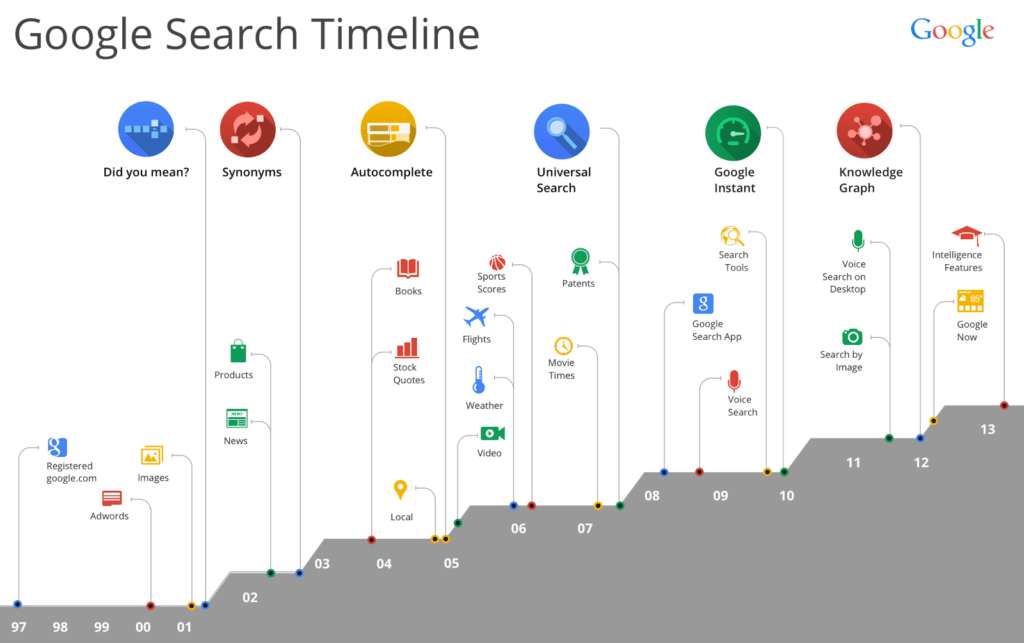Google, the world’s most popular search engine, serves billions of search queries daily, providing users with relevant and accurate results. Behind the scenes, Google’s algorithms work tirelessly to rank web pages based on a variety of factors.
While the exact details of these algorithms are kept secret to prevent exploitation, understanding their general principles and staying ahead of the game is essential for any website owner or digital marketer. In this article, we will explore some key aspects of Google algorithms and strategies to maintain a competitive edge in the ever-evolving digital landscape.
As a SEO marketer, I’ve never felt that Google’s algorithm changes were a surprise, because their guiding principle is to be the best search engine. They’re not confined by keywords and links. And as far as the result pages themselves, users want answers right away (zero click searches), or prefer images and videos. For this reason, Google has had to change. But the mission stays the same – be the world’s preferred search engine.
Understanding Google Algorithms:
Google’s algorithms are complex sets of rules and calculations designed to determine the relevance and quality of web pages in response to search queries. The most famous of these algorithms is “PageRank,” named after Google’s co-founder Larry Page, which evaluates the authority of web pages based on the number and quality of backlinks.
Over the years, Google has developed numerous algorithms and updates to improve search results. Some well-known updates include Panda, Penguin, Hummingbird, RankBrain, and BERT, each aimed at addressing specific issues such as low-quality content, spammy links, and understanding user intent better.

Providing Quality and Relevant Content:
Creating high-quality, relevant content is the backbone of any successful SEO strategy. Google’s algorithms prioritize content that satisfies user intent and provides value to visitors. Aim to create comprehensive, informative, and engaging content that answers common questions and addresses users’ pain points. Regularly update and refresh your content to ensure it remains accurate and up-to-date.
E-A-T: Expertise, Authoritativeness, and Trustworthiness:
Google’s emphasis on E-A-T means that websites are evaluated based on their expertise, authoritativeness, and trustworthiness. This is particularly crucial for websites that provide medical, financial, or legal advice, where accuracy and credibility are paramount. To improve E-A-T, highlight the qualifications and expertise of content creators, cite reputable sources, and ensure that your website is transparent about its purpose and contact information.
Mobile-Friendly and Page Speed:
With the significant rise in mobile users, Google prioritizes mobile-friendly websites in its rankings. Ensure that your website is responsive and optimized for various devices to provide a seamless user experience. Additionally, page loading speed is a crucial factor in user satisfaction and SEO rankings. Optimize your website’s performance by compressing images, leveraging browser caching, and using content delivery networks (CDNs).
Secure and Safe Browsing:
Google aims to provide a safe browsing experience for its users. Websites with SSL certificates and HTTPS encryption are preferred, as they ensure secure data transmission. Implement security measures to protect user information, and regularly monitor your website for malware or other security vulnerabilities.
User Experience (UX):
User experience is at the forefront of Google’s algorithm updates. Websites with excellent UX, including easy navigation, clear call-to-action buttons, and minimal intrusive ads, are rewarded in search rankings. Conduct user testing and gather feedback to continuously improve the UX of your website.
Voice Search Optimization:
With the rise of voice-activated devices and virtual assistants, voice search is becoming increasingly prevalent. Optimize your content for natural language and conversational queries. Consider creating FAQ-style content and featured snippets to increase your chances of appearing in voice search results.
Data-Driven SEO Strategies:
To stay ahead of the game, embrace data-driven SEO strategies. Utilize tools like Google Analytics and Search Console to gain valuable insights into user behavior, keyword performance, and traffic sources. Analyze this data regularly to identify areas for improvement and make informed decisions.
Stay Informed and Adapt:
Google frequently updates its algorithms to enhance search results and combat spam. Staying informed about these updates is crucial to maintaining a competitive edge. Follow reputable SEO news sources, attend conferences, and engage with the SEO community to stay up-to-date with the latest industry trends and best practices.
Build Quality Backlinks:
While link building remains important, it’s essential to focus on quality over quantity. Earn backlinks from reputable and relevant websites through guest posting, content partnerships, and creating valuable content that naturally attracts links. Avoid spammy link-building practices that could lead to penalties.
Conclusion:
Google’s algorithms are continually evolving to provide users with the best possible search experience. To stay ahead of the game and maintain or improve your website’s rankings, focus on providing high-quality, relevant content, optimizing for mobile devices, and prioritizing user experience. Embrace data-driven strategies, adapt to algorithm updates, and adhere to Google’s guidelines to ensure your website thrives in the ever-competitive digital landscape.
By staying informed, proactive, and committed to ethical SEO practices, you can increase your chances of success and visibility in search engine rankings. Remember that SEO is an ongoing process, and continuous improvement is key to staying ahead of the game in the dynamic world of online search.